Global Reserve System Reform: An Analysis of Ocampo's Article
VerifiedAdded on 2023/06/11
|6
|2184
|66
Report
AI Summary
This report critically analyzes an article advocating for the reform of the global reserve system, specifically focusing on the dominance of the U.S. dollar. The article identifies three key flaws: recessionary pressures, the Triffin Dilemma, and growing inequity. It explores the current system's vulnerabilities during financial crises and proposes alternative solutions, including a multi-currency system and an SDR-based global reserve. The report evaluates these proposals, considering the benefits of diversifying foreign exchange reserves and reducing dependence on the U.S. dollar. It also discusses the role of the IMF in promoting these reforms, analyzing both the positive and negative aspects of SDRs as a reserve currency, and the challenges of implementing these changes due to political influences and other obstacles. The report concludes by emphasizing the need for a stable global reserve system to promote sustainable economic development and ensure global liquidity.
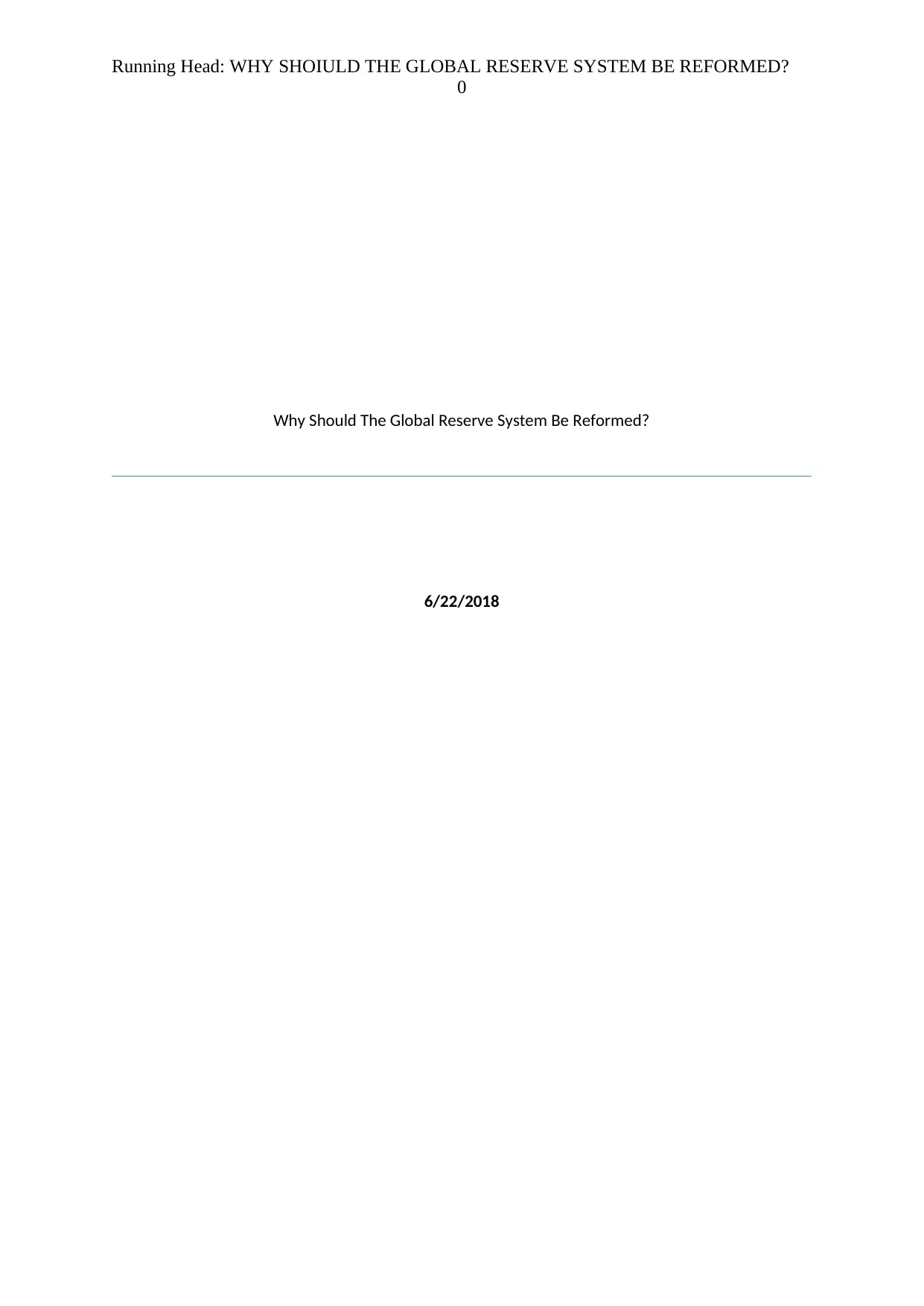
Running Head: WHY SHOIULD THE GLOBAL RESERVE SYSTEM BE REFORMED?
0
Why Should The Global Reserve System Be Reformed?
6/22/2018
0
Why Should The Global Reserve System Be Reformed?
6/22/2018
Paraphrase This Document
Need a fresh take? Get an instant paraphrase of this document with our AI Paraphraser
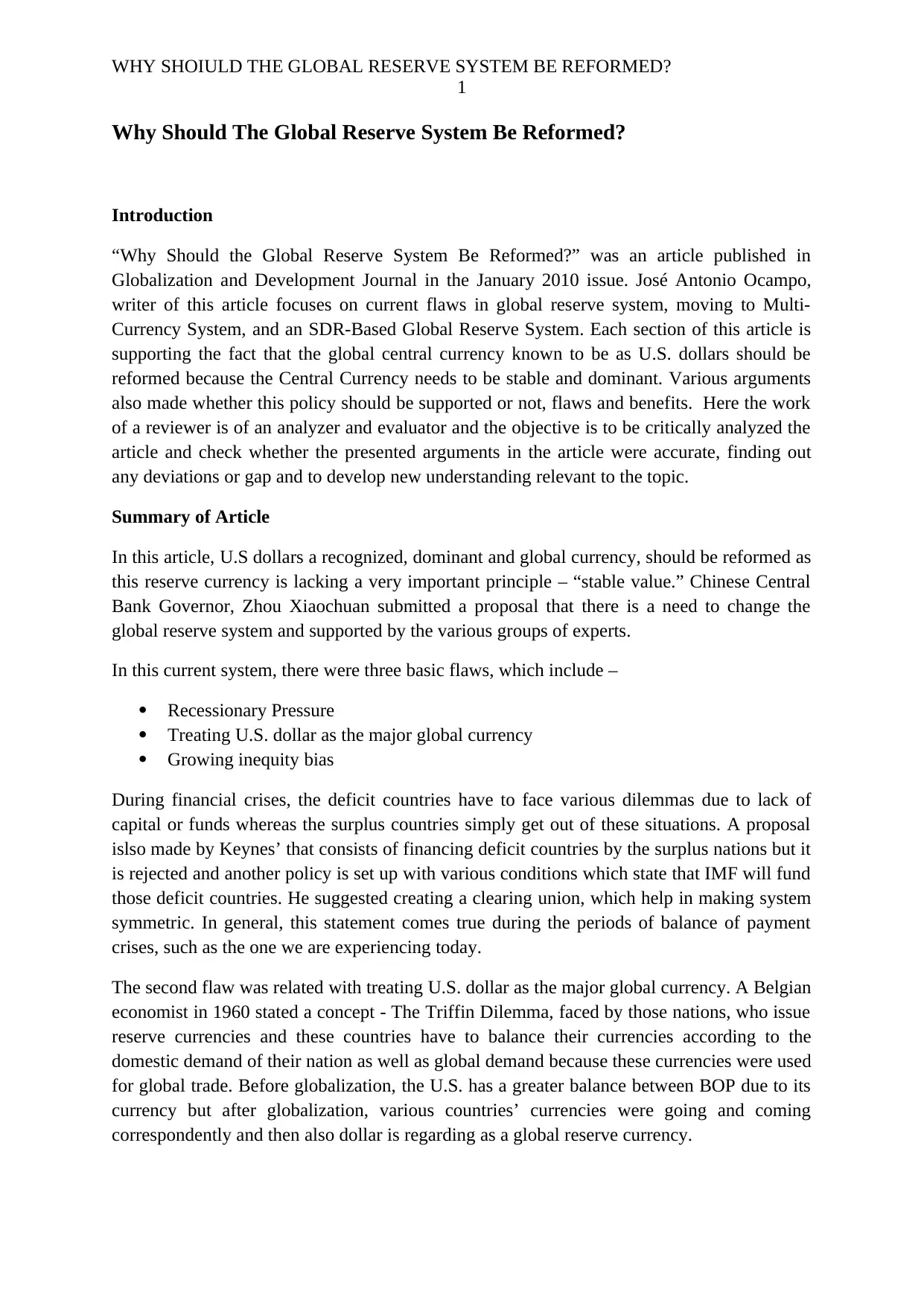
WHY SHOIULD THE GLOBAL RESERVE SYSTEM BE REFORMED?
1
Why Should The Global Reserve System Be Reformed?
Introduction
“Why Should the Global Reserve System Be Reformed?” was an article published in
Globalization and Development Journal in the January 2010 issue. José Antonio Ocampo,
writer of this article focuses on current flaws in global reserve system, moving to Multi-
Currency System, and an SDR-Based Global Reserve System. Each section of this article is
supporting the fact that the global central currency known to be as U.S. dollars should be
reformed because the Central Currency needs to be stable and dominant. Various arguments
also made whether this policy should be supported or not, flaws and benefits. Here the work
of a reviewer is of an analyzer and evaluator and the objective is to be critically analyzed the
article and check whether the presented arguments in the article were accurate, finding out
any deviations or gap and to develop new understanding relevant to the topic.
Summary of Article
In this article, U.S dollars a recognized, dominant and global currency, should be reformed as
this reserve currency is lacking a very important principle – “stable value.” Chinese Central
Bank Governor, Zhou Xiaochuan submitted a proposal that there is a need to change the
global reserve system and supported by the various groups of experts.
In this current system, there were three basic flaws, which include –
Recessionary Pressure
Treating U.S. dollar as the major global currency
Growing inequity bias
During financial crises, the deficit countries have to face various dilemmas due to lack of
capital or funds whereas the surplus countries simply get out of these situations. A proposal
islso made by Keynes’ that consists of financing deficit countries by the surplus nations but it
is rejected and another policy is set up with various conditions which state that IMF will fund
those deficit countries. He suggested creating a clearing union, which help in making system
symmetric. In general, this statement comes true during the periods of balance of payment
crises, such as the one we are experiencing today.
The second flaw was related with treating U.S. dollar as the major global currency. A Belgian
economist in 1960 stated a concept - The Triffin Dilemma, faced by those nations, who issue
reserve currencies and these countries have to balance their currencies according to the
domestic demand of their nation as well as global demand because these currencies were used
for global trade. Before globalization, the U.S. has a greater balance between BOP due to its
currency but after globalization, various countries’ currencies were going and coming
correspondently and then also dollar is regarding as a global reserve currency.
1
Why Should The Global Reserve System Be Reformed?
Introduction
“Why Should the Global Reserve System Be Reformed?” was an article published in
Globalization and Development Journal in the January 2010 issue. José Antonio Ocampo,
writer of this article focuses on current flaws in global reserve system, moving to Multi-
Currency System, and an SDR-Based Global Reserve System. Each section of this article is
supporting the fact that the global central currency known to be as U.S. dollars should be
reformed because the Central Currency needs to be stable and dominant. Various arguments
also made whether this policy should be supported or not, flaws and benefits. Here the work
of a reviewer is of an analyzer and evaluator and the objective is to be critically analyzed the
article and check whether the presented arguments in the article were accurate, finding out
any deviations or gap and to develop new understanding relevant to the topic.
Summary of Article
In this article, U.S dollars a recognized, dominant and global currency, should be reformed as
this reserve currency is lacking a very important principle – “stable value.” Chinese Central
Bank Governor, Zhou Xiaochuan submitted a proposal that there is a need to change the
global reserve system and supported by the various groups of experts.
In this current system, there were three basic flaws, which include –
Recessionary Pressure
Treating U.S. dollar as the major global currency
Growing inequity bias
During financial crises, the deficit countries have to face various dilemmas due to lack of
capital or funds whereas the surplus countries simply get out of these situations. A proposal
islso made by Keynes’ that consists of financing deficit countries by the surplus nations but it
is rejected and another policy is set up with various conditions which state that IMF will fund
those deficit countries. He suggested creating a clearing union, which help in making system
symmetric. In general, this statement comes true during the periods of balance of payment
crises, such as the one we are experiencing today.
The second flaw was related with treating U.S. dollar as the major global currency. A Belgian
economist in 1960 stated a concept - The Triffin Dilemma, faced by those nations, who issue
reserve currencies and these countries have to balance their currencies according to the
domestic demand of their nation as well as global demand because these currencies were used
for global trade. Before globalization, the U.S. has a greater balance between BOP due to its
currency but after globalization, various countries’ currencies were going and coming
correspondently and then also dollar is regarding as a global reserve currency.
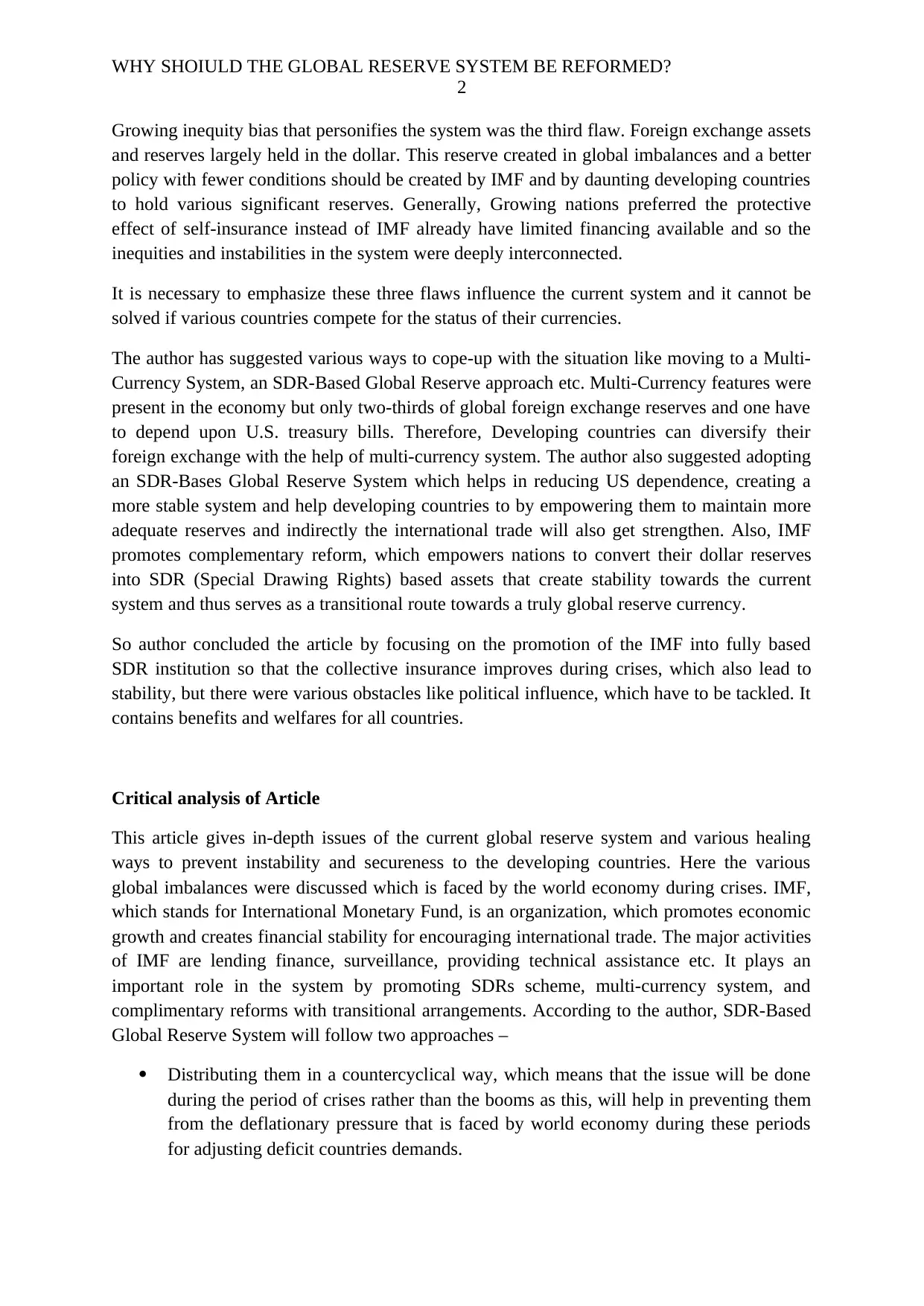
WHY SHOIULD THE GLOBAL RESERVE SYSTEM BE REFORMED?
2
Growing inequity bias that personifies the system was the third flaw. Foreign exchange assets
and reserves largely held in the dollar. This reserve created in global imbalances and a better
policy with fewer conditions should be created by IMF and by daunting developing countries
to hold various significant reserves. Generally, Growing nations preferred the protective
effect of self-insurance instead of IMF already have limited financing available and so the
inequities and instabilities in the system were deeply interconnected.
It is necessary to emphasize these three flaws influence the current system and it cannot be
solved if various countries compete for the status of their currencies.
The author has suggested various ways to cope-up with the situation like moving to a Multi-
Currency System, an SDR-Based Global Reserve approach etc. Multi-Currency features were
present in the economy but only two-thirds of global foreign exchange reserves and one have
to depend upon U.S. treasury bills. Therefore, Developing countries can diversify their
foreign exchange with the help of multi-currency system. The author also suggested adopting
an SDR-Bases Global Reserve System which helps in reducing US dependence, creating a
more stable system and help developing countries to by empowering them to maintain more
adequate reserves and indirectly the international trade will also get strengthen. Also, IMF
promotes complementary reform, which empowers nations to convert their dollar reserves
into SDR (Special Drawing Rights) based assets that create stability towards the current
system and thus serves as a transitional route towards a truly global reserve currency.
So author concluded the article by focusing on the promotion of the IMF into fully based
SDR institution so that the collective insurance improves during crises, which also lead to
stability, but there were various obstacles like political influence, which have to be tackled. It
contains benefits and welfares for all countries.
Critical analysis of Article
This article gives in-depth issues of the current global reserve system and various healing
ways to prevent instability and secureness to the developing countries. Here the various
global imbalances were discussed which is faced by the world economy during crises. IMF,
which stands for International Monetary Fund, is an organization, which promotes economic
growth and creates financial stability for encouraging international trade. The major activities
of IMF are lending finance, surveillance, providing technical assistance etc. It plays an
important role in the system by promoting SDRs scheme, multi-currency system, and
complimentary reforms with transitional arrangements. According to the author, SDR-Based
Global Reserve System will follow two approaches –
Distributing them in a countercyclical way, which means that the issue will be done
during the period of crises rather than the booms as this, will help in preventing them
from the deflationary pressure that is faced by world economy during these periods
for adjusting deficit countries demands.
2
Growing inequity bias that personifies the system was the third flaw. Foreign exchange assets
and reserves largely held in the dollar. This reserve created in global imbalances and a better
policy with fewer conditions should be created by IMF and by daunting developing countries
to hold various significant reserves. Generally, Growing nations preferred the protective
effect of self-insurance instead of IMF already have limited financing available and so the
inequities and instabilities in the system were deeply interconnected.
It is necessary to emphasize these three flaws influence the current system and it cannot be
solved if various countries compete for the status of their currencies.
The author has suggested various ways to cope-up with the situation like moving to a Multi-
Currency System, an SDR-Based Global Reserve approach etc. Multi-Currency features were
present in the economy but only two-thirds of global foreign exchange reserves and one have
to depend upon U.S. treasury bills. Therefore, Developing countries can diversify their
foreign exchange with the help of multi-currency system. The author also suggested adopting
an SDR-Bases Global Reserve System which helps in reducing US dependence, creating a
more stable system and help developing countries to by empowering them to maintain more
adequate reserves and indirectly the international trade will also get strengthen. Also, IMF
promotes complementary reform, which empowers nations to convert their dollar reserves
into SDR (Special Drawing Rights) based assets that create stability towards the current
system and thus serves as a transitional route towards a truly global reserve currency.
So author concluded the article by focusing on the promotion of the IMF into fully based
SDR institution so that the collective insurance improves during crises, which also lead to
stability, but there were various obstacles like political influence, which have to be tackled. It
contains benefits and welfares for all countries.
Critical analysis of Article
This article gives in-depth issues of the current global reserve system and various healing
ways to prevent instability and secureness to the developing countries. Here the various
global imbalances were discussed which is faced by the world economy during crises. IMF,
which stands for International Monetary Fund, is an organization, which promotes economic
growth and creates financial stability for encouraging international trade. The major activities
of IMF are lending finance, surveillance, providing technical assistance etc. It plays an
important role in the system by promoting SDRs scheme, multi-currency system, and
complimentary reforms with transitional arrangements. According to the author, SDR-Based
Global Reserve System will follow two approaches –
Distributing them in a countercyclical way, which means that the issue will be done
during the period of crises rather than the booms as this, will help in preventing them
from the deflationary pressure that is faced by world economy during these periods
for adjusting deficit countries demands.
⊘ This is a preview!⊘
Do you want full access?
Subscribe today to unlock all pages.

Trusted by 1+ million students worldwide
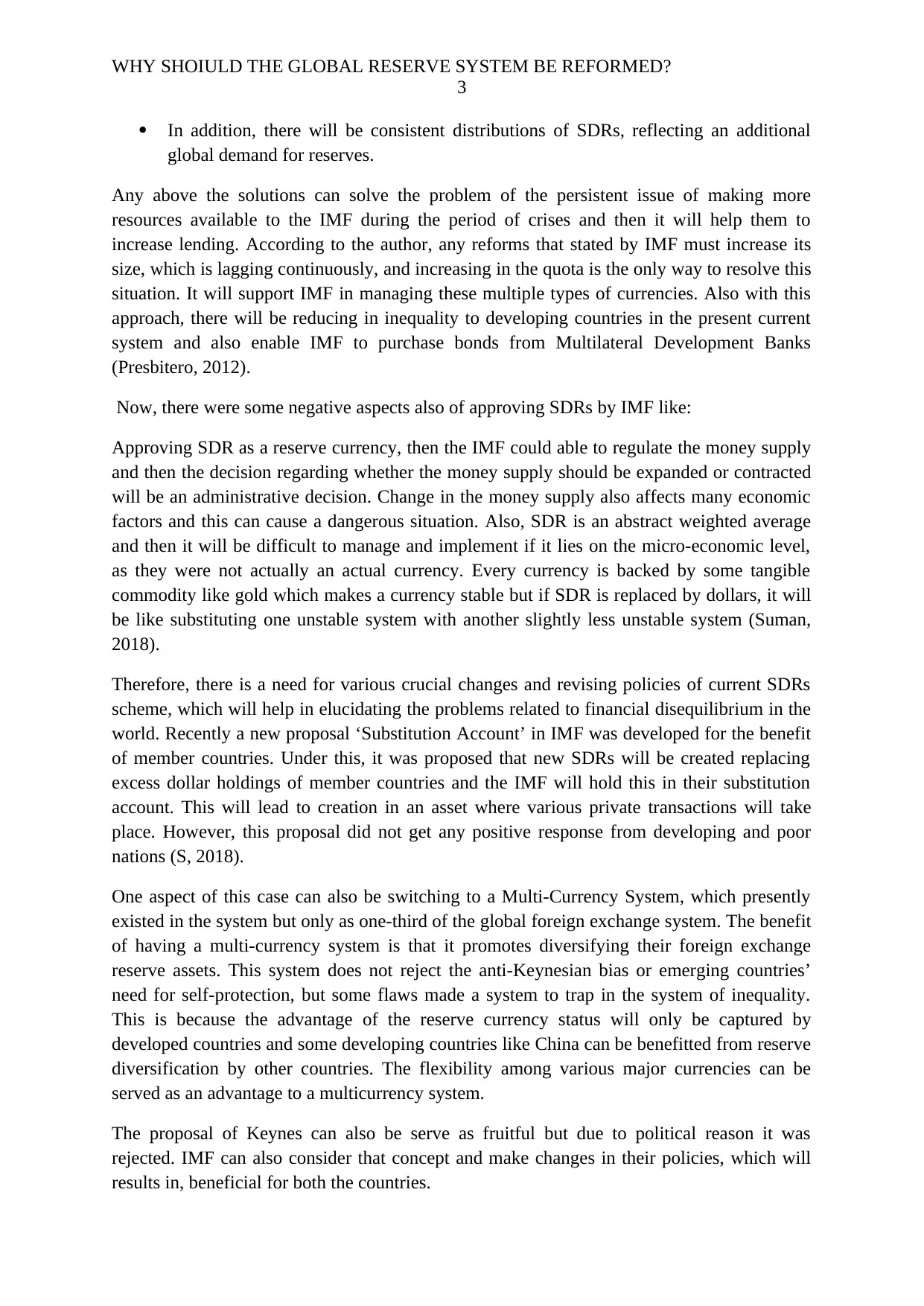
WHY SHOIULD THE GLOBAL RESERVE SYSTEM BE REFORMED?
3
In addition, there will be consistent distributions of SDRs, reflecting an additional
global demand for reserves.
Any above the solutions can solve the problem of the persistent issue of making more
resources available to the IMF during the period of crises and then it will help them to
increase lending. According to the author, any reforms that stated by IMF must increase its
size, which is lagging continuously, and increasing in the quota is the only way to resolve this
situation. It will support IMF in managing these multiple types of currencies. Also with this
approach, there will be reducing in inequality to developing countries in the present current
system and also enable IMF to purchase bonds from Multilateral Development Banks
(Presbitero, 2012).
Now, there were some negative aspects also of approving SDRs by IMF like:
Approving SDR as a reserve currency, then the IMF could able to regulate the money supply
and then the decision regarding whether the money supply should be expanded or contracted
will be an administrative decision. Change in the money supply also affects many economic
factors and this can cause a dangerous situation. Also, SDR is an abstract weighted average
and then it will be difficult to manage and implement if it lies on the micro-economic level,
as they were not actually an actual currency. Every currency is backed by some tangible
commodity like gold which makes a currency stable but if SDR is replaced by dollars, it will
be like substituting one unstable system with another slightly less unstable system (Suman,
2018).
Therefore, there is a need for various crucial changes and revising policies of current SDRs
scheme, which will help in elucidating the problems related to financial disequilibrium in the
world. Recently a new proposal ‘Substitution Account’ in IMF was developed for the benefit
of member countries. Under this, it was proposed that new SDRs will be created replacing
excess dollar holdings of member countries and the IMF will hold this in their substitution
account. This will lead to creation in an asset where various private transactions will take
place. However, this proposal did not get any positive response from developing and poor
nations (S, 2018).
One aspect of this case can also be switching to a Multi-Currency System, which presently
existed in the system but only as one-third of the global foreign exchange system. The benefit
of having a multi-currency system is that it promotes diversifying their foreign exchange
reserve assets. This system does not reject the anti-Keynesian bias or emerging countries’
need for self-protection, but some flaws made a system to trap in the system of inequality.
This is because the advantage of the reserve currency status will only be captured by
developed countries and some developing countries like China can be benefitted from reserve
diversification by other countries. The flexibility among various major currencies can be
served as an advantage to a multicurrency system.
The proposal of Keynes can also be serve as fruitful but due to political reason it was
rejected. IMF can also consider that concept and make changes in their policies, which will
results in, beneficial for both the countries.
3
In addition, there will be consistent distributions of SDRs, reflecting an additional
global demand for reserves.
Any above the solutions can solve the problem of the persistent issue of making more
resources available to the IMF during the period of crises and then it will help them to
increase lending. According to the author, any reforms that stated by IMF must increase its
size, which is lagging continuously, and increasing in the quota is the only way to resolve this
situation. It will support IMF in managing these multiple types of currencies. Also with this
approach, there will be reducing in inequality to developing countries in the present current
system and also enable IMF to purchase bonds from Multilateral Development Banks
(Presbitero, 2012).
Now, there were some negative aspects also of approving SDRs by IMF like:
Approving SDR as a reserve currency, then the IMF could able to regulate the money supply
and then the decision regarding whether the money supply should be expanded or contracted
will be an administrative decision. Change in the money supply also affects many economic
factors and this can cause a dangerous situation. Also, SDR is an abstract weighted average
and then it will be difficult to manage and implement if it lies on the micro-economic level,
as they were not actually an actual currency. Every currency is backed by some tangible
commodity like gold which makes a currency stable but if SDR is replaced by dollars, it will
be like substituting one unstable system with another slightly less unstable system (Suman,
2018).
Therefore, there is a need for various crucial changes and revising policies of current SDRs
scheme, which will help in elucidating the problems related to financial disequilibrium in the
world. Recently a new proposal ‘Substitution Account’ in IMF was developed for the benefit
of member countries. Under this, it was proposed that new SDRs will be created replacing
excess dollar holdings of member countries and the IMF will hold this in their substitution
account. This will lead to creation in an asset where various private transactions will take
place. However, this proposal did not get any positive response from developing and poor
nations (S, 2018).
One aspect of this case can also be switching to a Multi-Currency System, which presently
existed in the system but only as one-third of the global foreign exchange system. The benefit
of having a multi-currency system is that it promotes diversifying their foreign exchange
reserve assets. This system does not reject the anti-Keynesian bias or emerging countries’
need for self-protection, but some flaws made a system to trap in the system of inequality.
This is because the advantage of the reserve currency status will only be captured by
developed countries and some developing countries like China can be benefitted from reserve
diversification by other countries. The flexibility among various major currencies can be
served as an advantage to a multicurrency system.
The proposal of Keynes can also be serve as fruitful but due to political reason it was
rejected. IMF can also consider that concept and make changes in their policies, which will
results in, beneficial for both the countries.
Paraphrase This Document
Need a fresh take? Get an instant paraphrase of this document with our AI Paraphraser
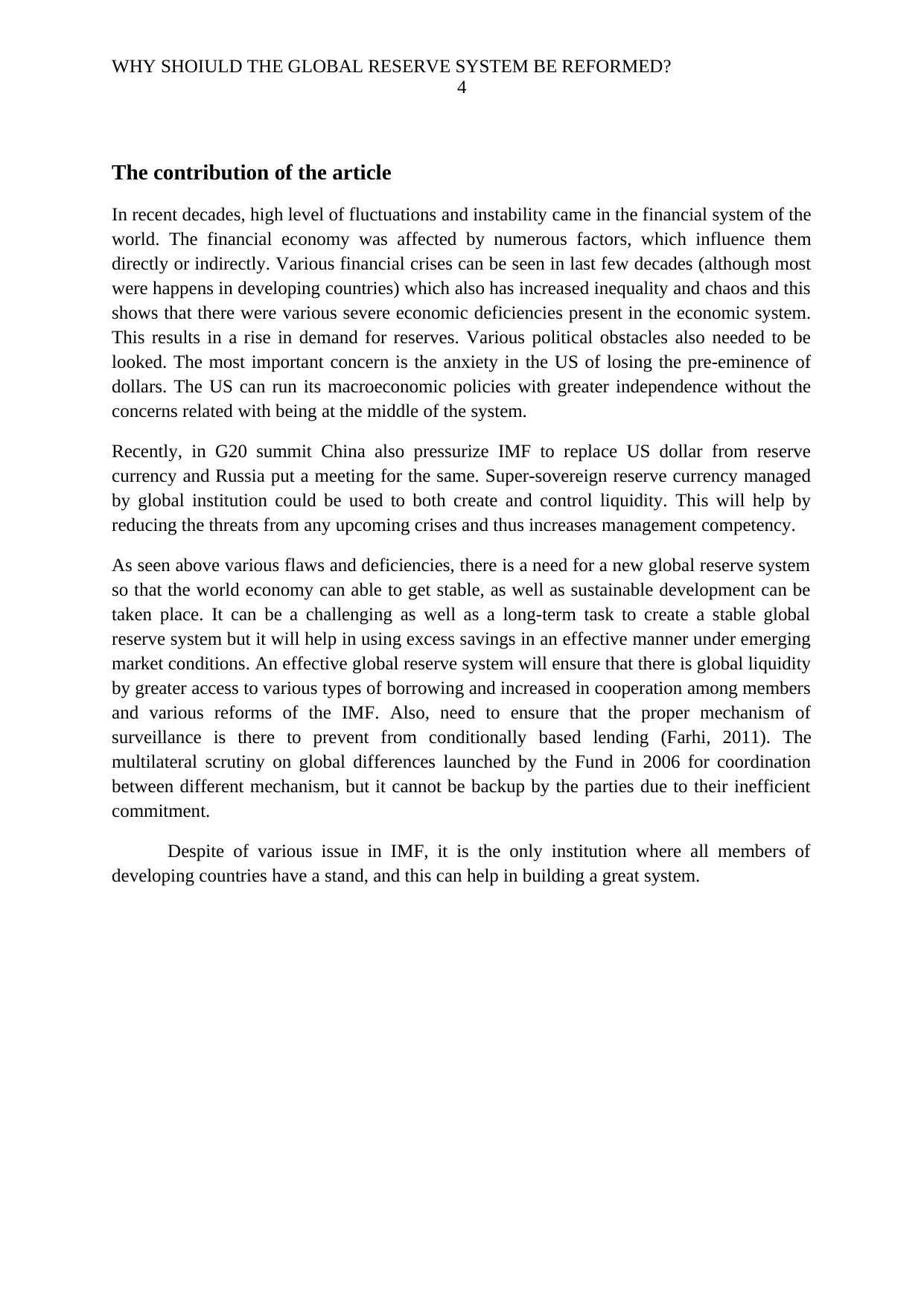
WHY SHOIULD THE GLOBAL RESERVE SYSTEM BE REFORMED?
4
The contribution of the article
In recent decades, high level of fluctuations and instability came in the financial system of the
world. The financial economy was affected by numerous factors, which influence them
directly or indirectly. Various financial crises can be seen in last few decades (although most
were happens in developing countries) which also has increased inequality and chaos and this
shows that there were various severe economic deficiencies present in the economic system.
This results in a rise in demand for reserves. Various political obstacles also needed to be
looked. The most important concern is the anxiety in the US of losing the pre-eminence of
dollars. The US can run its macroeconomic policies with greater independence without the
concerns related with being at the middle of the system.
Recently, in G20 summit China also pressurize IMF to replace US dollar from reserve
currency and Russia put a meeting for the same. Super-sovereign reserve currency managed
by global institution could be used to both create and control liquidity. This will help by
reducing the threats from any upcoming crises and thus increases management competency.
As seen above various flaws and deficiencies, there is a need for a new global reserve system
so that the world economy can able to get stable, as well as sustainable development can be
taken place. It can be a challenging as well as a long-term task to create a stable global
reserve system but it will help in using excess savings in an effective manner under emerging
market conditions. An effective global reserve system will ensure that there is global liquidity
by greater access to various types of borrowing and increased in cooperation among members
and various reforms of the IMF. Also, need to ensure that the proper mechanism of
surveillance is there to prevent from conditionally based lending (Farhi, 2011). The
multilateral scrutiny on global differences launched by the Fund in 2006 for coordination
between different mechanism, but it cannot be backup by the parties due to their inefficient
commitment.
Despite of various issue in IMF, it is the only institution where all members of
developing countries have a stand, and this can help in building a great system.
4
The contribution of the article
In recent decades, high level of fluctuations and instability came in the financial system of the
world. The financial economy was affected by numerous factors, which influence them
directly or indirectly. Various financial crises can be seen in last few decades (although most
were happens in developing countries) which also has increased inequality and chaos and this
shows that there were various severe economic deficiencies present in the economic system.
This results in a rise in demand for reserves. Various political obstacles also needed to be
looked. The most important concern is the anxiety in the US of losing the pre-eminence of
dollars. The US can run its macroeconomic policies with greater independence without the
concerns related with being at the middle of the system.
Recently, in G20 summit China also pressurize IMF to replace US dollar from reserve
currency and Russia put a meeting for the same. Super-sovereign reserve currency managed
by global institution could be used to both create and control liquidity. This will help by
reducing the threats from any upcoming crises and thus increases management competency.
As seen above various flaws and deficiencies, there is a need for a new global reserve system
so that the world economy can able to get stable, as well as sustainable development can be
taken place. It can be a challenging as well as a long-term task to create a stable global
reserve system but it will help in using excess savings in an effective manner under emerging
market conditions. An effective global reserve system will ensure that there is global liquidity
by greater access to various types of borrowing and increased in cooperation among members
and various reforms of the IMF. Also, need to ensure that the proper mechanism of
surveillance is there to prevent from conditionally based lending (Farhi, 2011). The
multilateral scrutiny on global differences launched by the Fund in 2006 for coordination
between different mechanism, but it cannot be backup by the parties due to their inefficient
commitment.
Despite of various issue in IMF, it is the only institution where all members of
developing countries have a stand, and this can help in building a great system.
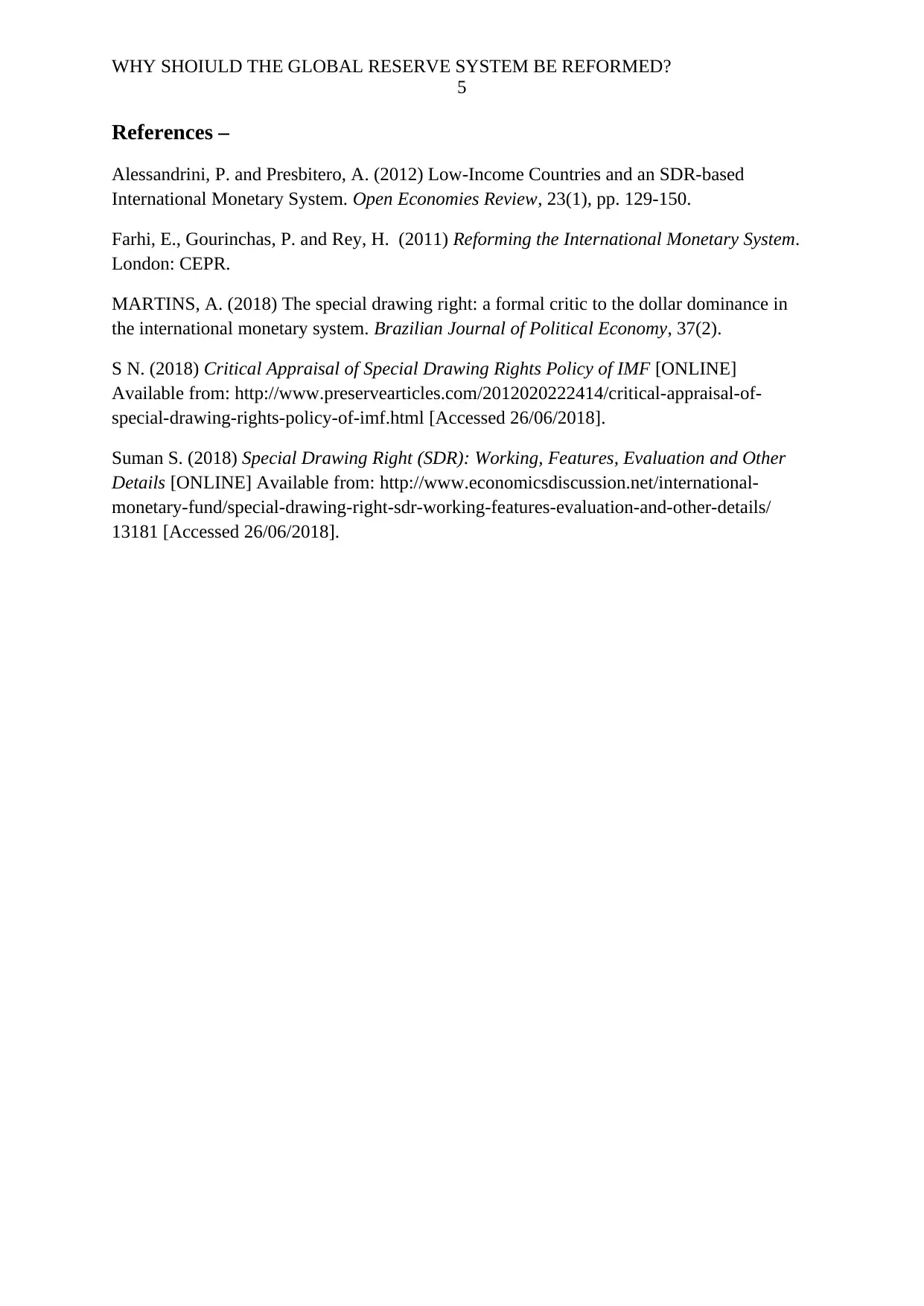
WHY SHOIULD THE GLOBAL RESERVE SYSTEM BE REFORMED?
5
References –
Alessandrini, P. and Presbitero, A. (2012) Low-Income Countries and an SDR-based
International Monetary System. Open Economies Review, 23(1), pp. 129-150.
Farhi, E., Gourinchas, P. and Rey, H. (2011) Reforming the International Monetary System.
London: CEPR.
MARTINS, A. (2018) The special drawing right: a formal critic to the dollar dominance in
the international monetary system. Brazilian Journal of Political Economy, 37(2).
S N. (2018) Critical Appraisal of Special Drawing Rights Policy of IMF [ONLINE]
Available from: http://www.preservearticles.com/2012020222414/critical-appraisal-of-
special-drawing-rights-policy-of-imf.html [Accessed 26/06/2018].
Suman S. (2018) Special Drawing Right (SDR): Working, Features, Evaluation and Other
Details [ONLINE] Available from: http://www.economicsdiscussion.net/international-
monetary-fund/special-drawing-right-sdr-working-features-evaluation-and-other-details/
13181 [Accessed 26/06/2018].
5
References –
Alessandrini, P. and Presbitero, A. (2012) Low-Income Countries and an SDR-based
International Monetary System. Open Economies Review, 23(1), pp. 129-150.
Farhi, E., Gourinchas, P. and Rey, H. (2011) Reforming the International Monetary System.
London: CEPR.
MARTINS, A. (2018) The special drawing right: a formal critic to the dollar dominance in
the international monetary system. Brazilian Journal of Political Economy, 37(2).
S N. (2018) Critical Appraisal of Special Drawing Rights Policy of IMF [ONLINE]
Available from: http://www.preservearticles.com/2012020222414/critical-appraisal-of-
special-drawing-rights-policy-of-imf.html [Accessed 26/06/2018].
Suman S. (2018) Special Drawing Right (SDR): Working, Features, Evaluation and Other
Details [ONLINE] Available from: http://www.economicsdiscussion.net/international-
monetary-fund/special-drawing-right-sdr-working-features-evaluation-and-other-details/
13181 [Accessed 26/06/2018].
⊘ This is a preview!⊘
Do you want full access?
Subscribe today to unlock all pages.

Trusted by 1+ million students worldwide
1 out of 6
Your All-in-One AI-Powered Toolkit for Academic Success.
+13062052269
info@desklib.com
Available 24*7 on WhatsApp / Email
![[object Object]](/_next/static/media/star-bottom.7253800d.svg)
Unlock your academic potential
Copyright © 2020–2026 A2Z Services. All Rights Reserved. Developed and managed by ZUCOL.
